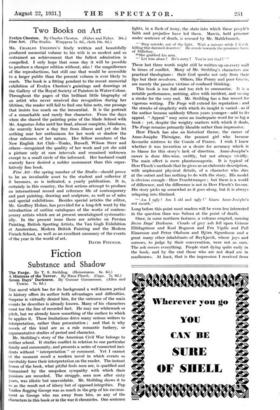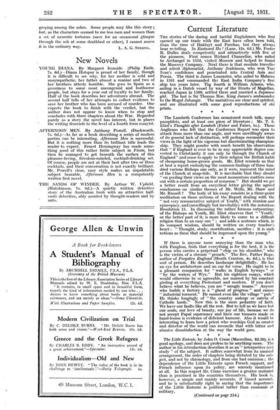Fiction
Substance and Shadow
The Forge. By T. S. Stribling. (Heinemann. 8s. 6d.)
THE novel which has for its background a well-known period in history offers its author both advantages and difficulties. Surprise is virtually denied him, for the outcome of the main events he describes is already known. Many of his characters must toe the line of recorded fact. He may use whitewash or pitch, but we already know something of the surface to which he applies it. These limitations drive many serious writers to interpretation, rather than presentation ; and that is why novels of this kind are as a rule romantic tushery, or argumentative studies of period and character.
Mr. Stribling's story of the American Civil War belongs to neither school. It studies conflict in relation to one particular family and community, and presents a series of connected inci- dents without " interpretation " or comment. Yet I cannot at the moment recall a modern novel in which events so inevitably force their interpretation on the reader. The instant lesson of the book, what pitiful fools men are, is qualified and humanized by the unspoken sympathy with which their passions are recorded. The struggle, seen now after sixty years, was idiotic but unavoidable. Mr. Stribling shows it to us as the result not of idiocy but of opposed integrities. Pap Vaiden flogging George was as much in the grip of his environ- ment as George who ran away from him, as any of the characters in this book or in the war it chronicles. One sentence lights, in a flash of irony, the state into which these people's faith and prejudice have led them. Marcia, held prisoner under sentence of death, is rescued by Mr. hialdebranch.
" Step outside, out of the light. Wait a minute while I f!iish killing this damned deserter.' He strode towards the prostrate form of Dilliehay.
LO She grabbed his arm.
" ' Let him alone ! He's sorry ! You're not God ' " Those last three words might still be written up on every wall in times of conflict. Many of Mr. Stribling's characters are practical theologians : their God speaks not only from their lips but their revolvers. Others, like Ponny and poor Gracie, are merely the passive victims of confused thinking.
This book is too full and too rich to summarize. It is a notable performance, untiring, alive with incident, and saving a stroke for the very end. Mr. Stribling has a fine record for vigorous writing. The Forge will extend his reputation : and the streaks of simplicity with which its insight is varied—as if the author became suddenly fifteen years younger—add to its appeal. " Appeal " may seem an inadequate word for so big a book : yet, despite the weighty matters with which it deals, The Forge remains primarily likeable rather than impressive.
Herr Flesch has also an historical theme, the career of Anne-Josephe Theroigne, the peasant girl who became favourite mistress to the Cousin of France. I wish I knew whether it was invention or a desire for accuracy which is to blame for this story's lack of direction. Anne-Josephe's career is done film-wise, swiftly, but not always vividly. The main effect is mere phantasmagoria. It is typical of Herr Flesch's methods that he gives us an elaborate description, with unpleasant physical details, of a character who dies at the outset and has nothing to do with the story. His model is obvious enough—Herr Feuchtwanger ; but there is a world of difference, and the difference is not in Herr Flesch's favour. His story picks up somewhat as it goes along, but it is always relapsing into filmland.
" Am I ugly ? Am I old and ugly ? ' hisses Anne-Josephe's red mouth."
Long before this point most readers will be even less interested in the question than was Suleau at the point of death.
Once, in some northern fastness, a volcano erupted, causing Seven Days' Darkness. Clouds of grey ash fell upon Grimur Ellidagrimur and Karl Bogason and Fru Vigdis and Pall Einarsson and Petur Olafsson and Bjorn Sigurdsson and a great many other inhabitants of Reykjavik, whose joys and sorrows, to judge by their conversation, were not as ours. The ash covers everything. People start dying quite early in the book, and by the end those who are not dead are in madhouses. At least, that is the impression I received from groping among the ashes. Some people, may like this story ; but, as the characters seemed to me less men and women than a set of neurotic tortoises (save for an occasional glimpse _through the ash at some deathbed or other), I cannot assess































 Previous page
Previous page